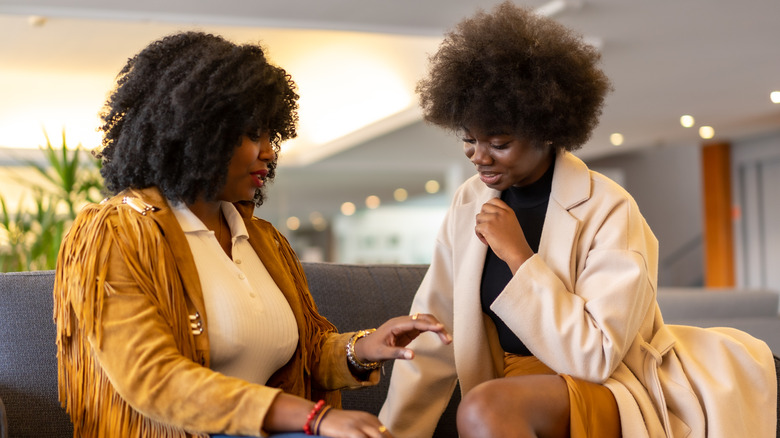How To Master Small Talk And Foster New Relationships
Small talk gets a bad rap, and we get it. It's common to complain about the polite, impersonal conversations we need to have sometimes. After all, they can be repetitive, dull, and insincere. But good conversation is an art, and seemingly simple, banal interactions are often the building blocks of deeper connection. "Small talk allows us to foster connections one step at a time," explains couples and family therapist Judith Aronowitz in an exclusive interview with Women. "It helps us to establish a rapport and create a feeling of safety when you are just getting to know someone."
The beauty of small talk is how it can establish a sense of safety and mutuality with a new person — whether you're at a bar or joining a book club. In a sense, beginning with small talk signals that you're familiar with standard social conventions. Yes, talking about the weather might not be wildly stimulating, but it also conveys that you're considerate enough not to open with provocative or uncomfortably personal topics. While the conversations might be superficial, you'll gather a sense of the other person's boundaries, warmth, and interests. "It can be the first step in forming a new friendship," says Aronowitz. "It allows for one to open up the possibility for a relationship to grow over time." If you're looking to build new relationships, upping your small talk game is the best place to start. With time, it will provide the foundation for deeper conversations.
Be an active listener
One of the best tips for navigating small talk is to be an active listener. Active listening involves staying mentally engaged with what the other person is sharing, as well as using verbal and physical cues to convey to the other person that you're present with what they're sharing. "Give your full attention, make eye contact, and listen to understand," Judith Aronowitz exclusively tells Women. "You might nod if you agree or ask clarifying questions. This lets the person know you're engaged."
Active listening is an important skill because it helps signal to the other person that you value them. "Ultimately, it shows respect and value for the other person's needs, concerns, and ideas as the listener is actively signaling the other person matters to them," said psychologist Sabrina Romanoff, in an interview with Verywell Mind. Even if the topic of conversation isn't something you're naturally intrigued by, a great strategy is to look for an angle or aspect that is genuinely interesting to you. "You never know what you don't know, and it's an opportunity to learn something new and expand your own thoughts on a topic," says Aronowitz.
Let the environment shape your conversation
If you're worried about running out of topics, allow the location where the conversation is taking place to be a source of inspiration. Straightforward comments that engage with the environment around you are a great way to get conversation flowing. Plus, this helps get you away from rote questions like "How are you?" or "What do you do?" You're likely to get more interesting answers and find more authentic common ground, too. "If I'm at a 5K race this summer, I'll say to the person next to me, 'What's your best ingredient for success at these things?' Or, 'Have you ever done this before?'" Debra Fine, author of "The Fine Art of Small Talk," told TIME.
While you're at it, put your phone away. Staring down at a screen will make you less engaged with your surroundings and the other person you're talking to. In turn, that will give you less to talk about. So keep the phones away.
Ask open-ended questions
The key to enjoyable small talk is a trade-off. "Small talk should be reciprocal, with each person taking turns," says Judith Aronowitz. That means, in addition to sharing, it's key to ask good questions. This is a great tip, whether you're making new connections or looking to keep your adult friendships for life.
The best questions are those that invite a more complex answer than simply "yes" or "no," and demonstrate an interest in the other person. "Start a question with what, where, when, and who," says Aronowitz. These are the sort of inquiries that get a robust conversation flowing. "Use open-ended questions to keep the conversation flowing seamlessly." Asking slightly unexpected questions like "What are you looking forward to?" or "What's been a highlight of your week?" gives the other person room to expand and taps into their enthusiasm. Plus, they'll remember you as someone who asks more interesting questions than the standard "What do you do?"
Don't take it personally
Finally, one of the best ways to master small talk is by simply trying to get out of your own head. Don't overthink it. "Enjoy yourself," says Judith Aronowitz. "Remain light, connected, and interested. These are wonderful ingredients for a successful conversation." The more present you are with the other person — rather than internally fixating on trying to have a good conversation — the more likely you are to make a genuine connection. "You cannot be charismatic if you're beating yourself up at the same time," explained Olivia Fox Cabane, author of "The Charisma Myth," to Self.
Let go of any self-talk and think about the present moment. "Focus on authenticity, don't stress on trying to impress or looking a certain type of way," says Aronowitz. "Be you." If that feels scary, especially if you're intimidated by the pressure of getting small talk "right," bear in mind that rejection is rarely personal and often overestimated. A 2018 study reveals that people tend to underrate how much others enjoy speaking with them. "We all have this negative voice in our heads that tells us we're not very good at this social stuff," psychologist Gillian Sandstrom told TIME. "But the data suggest that people actually like you more than you think they do."




